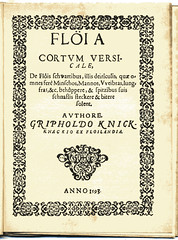gripholdus knickknackius ex floilandia
All thanks be to Languagehat. Because of him, I have discovered a new (to me) blog: Varieties of Unreligious Experience. This is my kind of blog: well-written, quirky mini-essays on little known bits of letters and languages. For example, this entry about some strange varieties of Latin. Not your Cicerone’s classical Latin, not your Scaliger’s deracinated, humanist Latin, and not your father’s bog or kitchen Latin, but the over-the-top, outré Latin of the Hisperica Famina, of Vergilius Maro Grammaticus [fl. 658 CE], or of (my personal fave) Merlinus Coccajus (né Teofilo Folengo [1491–1544]). That’s the latter’s portrait, scanned from the frontispiece of Theophili Folengi vulgo Merlini Coccaii opus macaronicum notus illustratum. Cui accessit vocabularium vernaculum, Etruscum, et Latinum. Editio omnium locupletissima. Pars prima. Amstelodami. MDCCLXVIII.
I’ve been a big fan of Macaronic poetry ever since running across a reference to it in Ernst Robert Curtius’ Europäische Literatur und lateinisches Mittelalter (1948). Inaugurated by Typhis Odaxius (or, Tifi Odasi) in his Macaronea and perfected by Folengo [1496–1544] in his sublime mock-heroic Baldus. Written in Latin hexameters, with überlatinifized vulgar-language words. Although, the term macaronic stems from the early 16th century, the tendency to mix languages in poetry has been around at least as early as Ausonius. Here’s a late 16th century German example:
Angla floosque canam, qui Wassunt pulvere svvarto,
Ex watroque simul stoitenti et blaside dicko,
Multipedes deiri qui possunt huppere longe,
Non aliter quam si flöglos natura dedisset.
Illis sunt equidem, sunt inquam corpora kleina,
Sed mille erregunt menschis matrasque plagasque,
Cum steckunt snaflum in livum blautumque rubentem
Exsugant; homines sic, sic vexeirere possunt!
Ex quæ tandem illis pro tantalonia restant
Vexeritate, et quem nemant pro vulnera lodum!
[Flöia, cortum versicale, de flôis schwartibus, illis deiriculis, quæ omnes ferè Minschos, Mannos, Vveibras, Iungfras, &c., behùppere, et spitzibus suis schnaflis steckere et bitere solunt, authore. Gripholdo Knickknackio ex Floilandia. Anno 1593. Via Carl Blümlein Die Floia und andere maccaronische Gedichte, 1900]
This succulent post on palæological grammar has reminded me that I am still searching for a copy of Non olet; oder, Die heiteren Tischgespräche des Collofino über den orbis cacatus, nebst den neuesten erkenntnistheoretischen Betrachtungen über das Leben in seiner phantastischen Wirklichkeit erzählt von ihm selbst (1939) by Collofino [1867–1947].
Labels: language, literature



2 Comments:
Well met, Uncle. I didn't know you were blogging again, so I'll have to update. Curiously enough, I'll be writing about Epea Pteroenta in my next post.
Great! I look forward to reading what you have to say about Mr Horne Tooke.
Post a Comment
Subscribe to Post Comments [Atom]
<< Home